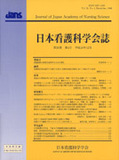Japanese
English
- 販売していません
- Abstract 文献概要
- 参考文献 Reference
要旨
本研究の目的は,術後せん妄症状の発現,睡眠覚醒パターンおよび夜間尿中プロスタグランジン(prostaglandin:PG)排泄量の関係を明らかにすることである.対象は,右開胸胸部食道全摘術を受け,ICUに入室した男性19名(平均年齢64.7歳)であった.術後3日目まで,20時から翌朝8時までの間,1時間ごとに11せん妄症状および睡眠覚醒状況を観察した.さらに,2時間ごとに尿検体を採取し,EIAキットを用いて尿中PGE2排泄量を測定した.
結果から,せん妄症状が発現した対象者をせん妄症状群(9名)に,その他を非せん妄症状群(10名)に分類した.非せん妄症状群は規則的な睡眠覚醒パターンを示したが,せん妄症状群は術後1日目から不規則であった.また,9せん妄症状が睡眠覚醒パターンの乱れと同時または先行して発現した.PGE2排泄量は,非せん妄症状群では術後1日目のみ増加したが,せん妄症状群では術後日数に従って増加した.
術後せん妄症状を発現した対象者が全員睡眠パターンの乱れを呈したことから,睡眠覚醒パターンの乱れと尿中PGE2排泄パターンが関係していることが示唆された.
Abstract
The purpose of this study was to clarify the relationships among delirium, sleep-awake patterns and urinary excretion of prostaglandin in patients after surgery. The subjects were 19 men (mean age, 64.7 years age) who had undergone total esophagectomy (with right thoracotomy) for cancer of the thoracic esophagus. Post-operative delirium was classified into 11 behaviors and the sleep-awake state was graded into four categories. Urinary excretion of prostaglandin E..was determined using an EIA kit.
The results showed a regular sleep-awake pattern in the non-delirium group (n=10). In contrast, the delirium symptoms group (n=9) showed irregular sleep-awake patterns on postoperative days 1-3. In addition, only nine of the symptoms of postoperative delirium occurred at the time, or before, the sleep-awake pattern changed. Urinary excretion of prostaglandin E.. increased only on postoperative day one in the non-delirium group,whereas it increased throughout the observation period in the delirium symptoms group. These results suggest that a nocturnal sleep disorder and the presence of urinary prostaglandin affect the occurrence of postoperative delirium.
Copyright © 2006, Japan Academy of Nursing Science. All rights reserved.


